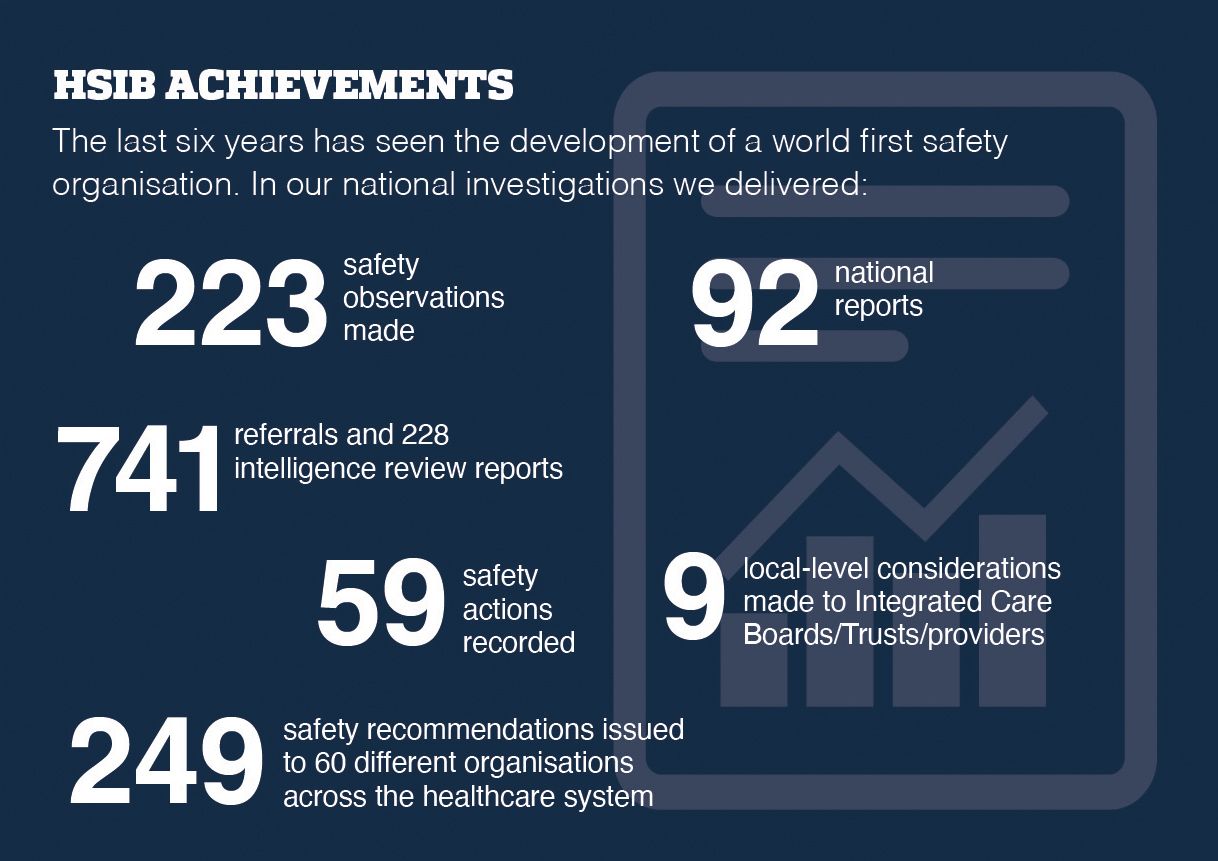A new
era dawns
Andrew Murphy-Pittock on the body driving radical change in patient safety


Andrew Murphy-Pittock: Education Director,
Health Services Safety Investigations Body in England
The Healthcare Safety Investigation Branch (HSIB) has gone through a significant organisational change, with the old HSIB now no longer in existence. It has been a challenging and exciting time as we established ourselves as a new arm’s length independent investigation body: the Health Services Safety Investigations Body (HSSIB).
As Education Director, my role has evolved rapidly and it is an honour to start to have potential impact on patient safety across the world by sharing new ways of investigating patient safety incidents, leading to system-level change. We are a unique organisation and want to continue to develop our ways of working and help make care safer for all.
Formed in 2017, the HSIB was created to improve patient safety through independent investigations into NHS-funded care across England. Our investigations were delivered through two programmes: national and maternity. There were differences in how they were carried out and how reports were published, but the aims were the same: to share learning and to make recommendations that improve safety at a national level.
Our investigations focused on systems and processes in healthcare, identifying the factors that could have led, or could potentially lead, to patient harm. We do this without attributing blame or liability, valuing independence, transparency, objectivity, expertise and learning for improvement in all that we do.
Our investigation process was largely based on a referral model, where we often explored a single patient safety event before helping to consider any learning at a national level.
The HSIB officially became the HSSIB on 1 October, and is enshrined in law by the Health and Care Act 2022 in England.
This was a natural evolution for the HSIB, leading to our full independence as an arm’s-length body (ALB). We now want to ensure our work has an impact on patient safety in healthcare settings in England (our core remit), but also be able to share our learning across the UK and beyond.
Our investigators bring a unique mix of clinical and non-clinical experience. We consult widely across the UK and internationally to ensure our work is informed by appropriate and relevant expertise.
The HSSIB has the function of investigating incidents that “occur in England during the provision of healthcare services and have or may have implications for the safety of patients”.
Key Points
Have or may have?
The HSSIB could investigate areas where harm/impacts on patient safety have not occurred but could be likely.
What are ‘healthcare services’?
The HSSIB can investigate any patient safety incident involving the provision of healthcare across a range of NHS services, from primary care to hospital care and community care. However, the HSSIB cannot investigate issues that may arise in social care.
What about the independent sector?
The HSSIB can investigate independent healthcare: “where an investigation relates to an incident that did not occur during the provision of NHS services, the HSSIB must consider whether, in relation to any risks identified, the systems and practices in the provision of NHS services could be improved”.
What about Scotland, Wales and Northern Ireland?
Wales and Northern Ireland can request the HSSIB carry out an investigation and be charged on a cost-recovery basis. Scotland, however, is not currently covered in the HSSIB’s core remit but can access its commercial offerings.

New powers
The Health and Care Act 2022 gives us two key powers: Section 118 – powers of entry, inspection and seizure; and Section 119 – powers to require information.
These powers also come with a key prohibition on disclosure, where the protected materials must not be disclosed and no powers in other legislation can require this disclosure. This ensures we will continue to work in an open and honest manner with those involved in our investigations.
Our process for selecting investigations is evolving. Although we may still wish to explore specific reference events, we are embracing a more proactive and thematic approach to our work.
We will be increasing our proactive engagement with stakeholders, including patient and family groups, to understand where areas of concern exist in the healthcare system and how an HSSIB investigation can help to address some of these wider challenges. We will also look to explore these areas in different ways to increase the methods by which we investigate and the learning we can generate to help support the system to improve patient safety and galvanise system-wide action around these issues.
Sharing learning
The education function was set up with the intention of sharing our learning through training around our investigation methods and techniques. We want to support the development and professionalisation of the role of patient safety investigators at a local level, giving them the tools to undertake systems-focused investigations and produce effective recommendations.
The education team brings together experts from multiple safety-critical industries. They bring knowledge and skills from the fields of human factors, engineering, law, systems engineering, psychology and investigation practice.
We have developed a unique education programme to help investigators with their local practice to improve patient safety. This education programme is provided free to the NHS in England and also meets the requirements of the Patient Safety Incident Response Framework (PSIRF) introduced across England in 2022.
The aims of the PSIRF complement the HSSIB approach: compassionate engagement and involvement of those affected by patient safety incidents, application of a range of system-based approaches to learning from patient safety incidents, considered and proportionate responses to patient safety incidents, and supportive oversight focused on strengthening response system functioning and improvement.
We have developed a multi-modal delivery method with a combination of on-demand online learning in an easily digestible modular format and small, live group sessions.
We have developed eight courses with more than 14,000 enrolments. We also have an active alumni community, ensuring we remain engaged with learners.
In our new form as an ALB we have been able to offer these programmes as a commercial offering beyond our core audience of the NHS in England. We work with other ALBs and government bodies working across the world to share NHS learning.
We have also established the International Patient Safety Organisations Network, with members in 19 time zones. This has illustrated that patient safety issues are the same on a global scale and that by sharing learning we all improve.
What next? We are only just starting as an independent body and hope to demonstrate true impact on safety for our patients. We want to continue to collaborate with partners across the system and I would encourage all readers to be curious, engage and challenge us.
